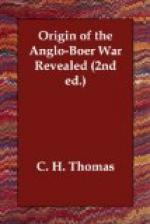Considering, on the other hand, that the English Government had known much about the Afrikaner Bond menace, it is singular that precautionary measures had halted with that bare effort of making military observations. The only way to account for this apparent lethargic inaction is the assumption that a persevering patience and friendly attitude was expected in time to effectually dissipate all trouble in South Africa, and that a display of anxiety or of force would have frustrated such peaceable tactics. In refutation of the aspersion against England, it may be sufficient to point to the fact that during those very years (1896-7) both Republics were in a condition of complete helplessness through the rinderpest scourge which was then raging. If any hostile designs had in reality existed they could have been carried out with utmost ease then, as that scourge presented no obstacle to England. But it was the programme of peace which was pursued as undeviatingly then as since, with a constancy which refused to be foiled.
Pamphlet entitled A Hundred Years of Injustice
A mass of so-called proof against England of her guilt in provoking the present war and justifying the Boer attitude was presented to the public in South Africa and abroad in November last in the shape of a voluminous pamphlet entitled A Hundred Years of Injustice (published both in English and Dutch, and later even translated into French). That production covers Boer history and its troubles with England up to 1881. It then travels over the diplomatic appeals of the Transvaal delegation, which resulted in the renewed convention of 1884. Then it wades through all the mire of academic squabble re suzerainty, etc. After exhausting the Jameson episode with bitter invective, and seeking applause for the Transvaal Government for its professed desire to conciliate and to propitiate England by the offer of a seven years’ franchise, the reader is, in conclusion, ’treated to a literary display of pyrotechnic denunciations and prophetic burdens against wicked Albion, with appeals to divine justice for righting the cause of an innocent nation so foully driven to a war of pure self-defence.
Lest he be taken unawares the reader of that pamphlet would do well to note the significant fact in connection with those preferred accusations and aspersions that not a single act construable to the prejudice of England is adduced dating after the Anglo-Transvaal peace of 1881, that peace which had been mutually understood to close up all by-gones. But the recriminations all revert to previous history, nothing having occurred since 1881 to form real grounds for accusations. There had, on the contrary, been an exhibition of unwearied friendly endeavours on the part of Great Britain to maintain loyal peace with an ever-shifty and truculent Government, and to induce it to desist from scandalous intrigue against imperial interests in South Africa, and to adopt a more rational attitude towards Uitlanders, which in itself would have precluded troubles like that of the Johannesburg revolt and the Jameson raid.




